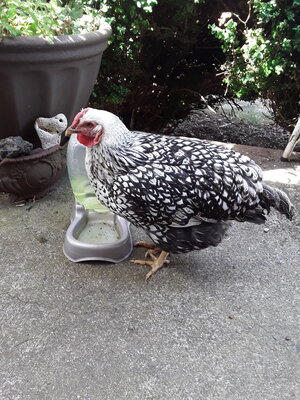- Sep 16, 2011
- 4
- 4
- 61
I have a 9 yr old Silver lace Wyandotte who recently passed some bright red blood. I assume it is coccidiosis, though her stool shows no blood. She has passed some green liquidy stool, which smells weird. She is free range in my yard, though she is locked in a small coop at night. It would be very difficult to limit her to one waterer. I can usually catch her, so thought it might be best to hand treat her with a syringe. Wondering what dose to give of Corid to a single bird?
Of note, it has been very hot lately. I have 2 other hens, who I know should be treated, too, but I would never be able to catch them, so will put medication in their coop water and hope for the best.
Patti
Of note, it has been very hot lately. I have 2 other hens, who I know should be treated, too, but I would never be able to catch them, so will put medication in their coop water and hope for the best.
Patti









